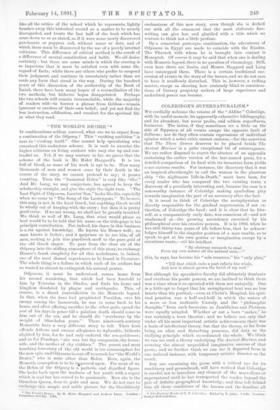" THE WORLD'S DE SIRE.''*
IP continuations seldom succeed, what are we to expect, from a continuation of the Odyssey ? This " vaulting ambition" is sure to " o'erleap itself." One cannot help speculating who -conceived this audacious scheme. It is rash to exercise the higher criticism on living authors who may rise up and con- tradict us. Yet, if we may venture so far, we guess that the scheme of the book is Mr. Rider Haggard's. It is too full of blood, as some of his work is apt to be. How many thousands of men and women come by their death in the -course of the story, we cannot pretend to say ; it passes counting. Then the "Immortal Helen" is very like "She." And Mr, Lang, we may conjecture, has agreed to keep the scholarship straight, and give the style the right turn, "The Last Fight of Odysseus, Laertes' Son," looks like his, especially when we come to " The Song of the Lfestrygons." To be sure, this song is not in the least Greek, but anything Greek would be wholly out of keeping with the story ; but then it is pretty good verse. If wo are wrong, we shall not be greatly troubled. We think so well of Mr. Lang, that what would please us best would be to be told that his name on the title..page is his principal contribution, For, indeed, his share in this business is a sin against knowledge. He knows his Homer well; no man knows it better ; and it sprprises us to see him, of all men, seeking to join this pinchbeck stuff to the pure gold of the old Greek singer. To pass from the clear air of the Odyssey into the stifling atmosphere of this story, to exchange Homer's frank simplicity for all this melodrama, is, indeed, one of the most dismal experiences to be found in literature. The whole thing is a failure in which each of its authors has BO wasted as almost to extinguish his natural genius.
Odysseus, it must be understood, comes home from his second wandering, that which had been foretold to him by Teiresias in the Shades, and finds his home and kingdom desolated by plague and earthquake. This, of course, is a direct contradiction to the Homeric legend. In that, when the hero had propitiated Poseidon, ever his enemy among the Immortals, he was to come back to his home, and after offering sacrifice to the other gods, spend the rest of his days in peace till a painless death should come to him out of the sea, and he should die "overborne by the weight of bliss-laden years."' These nineteenth-century Homerithe have a very different story to tell. Their hero offends Athene and swears allegiance to Aphrodite, hitherto slighted by him, for he had only endured the sea-goddesses ; 'and as for Penelope, " she was but thy companion, thy house- wife, and the mother of thy children," The purest and most touching love-story of the old world is too commonplace for the new epic, and Odysseus is sent off to search for "the World's Desire," who is none other than Helen, Here, again, the Homeric conception is to be improved upon. For most of us, the Helen of the Odyssey is a pathetic and .dignified figure. She looks back upon the madness of her youth with a regret which is real but has ceased to be passionate. Now she is the blameless Queen, dear-to gods and men. We do not care to exchange this simple and noble picture for the bloodthirsty • Thu World's Doefro. By H. Rider Haggard and Andrew Lang. London Lonsmane and Co. 1E90.
enchantress of this new story, even though she is decked out with all the ornament that the most elaborate fine- writing can give her, and glorified with a title which we venture to think not a little profane.
By a somewhat grotesque combination, the adventures of Odysseus in Egypt are made to coincide with the Exodus. The Pharaoh with whom he is brought into contact is Meneptah. Of course it may be said that when one is dealing with Homeric legend, there is no question of chronology. Still, even here there are limits, and Messrs. Haggard and Lang have outatepped them. There is a certain traditional suc- cession of events in the story of the heroes, and we do not care to have it needlessly disturbed. This is, however, a trifling matter, except as showing how curiously blind to considera- tions of literary propriety writers of large experience and undoubted power can become.


































 Previous page
Previous page